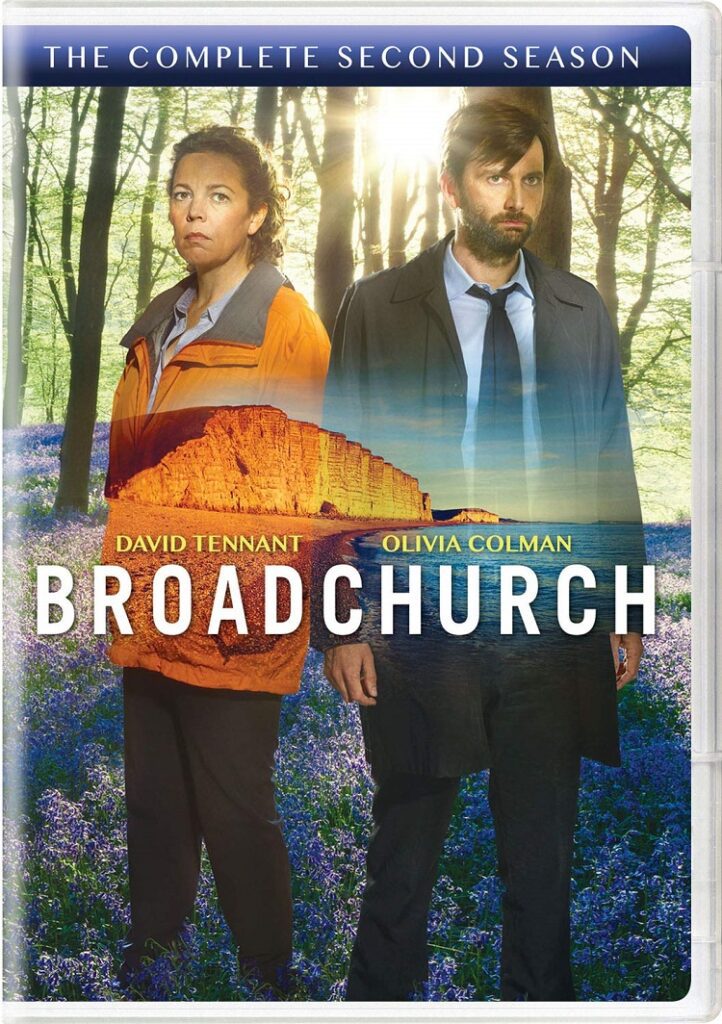
When I heard they were making a second season of Broadchurch, I was both excited and a bit trepidatious. The first season was such a perfect little drama that I was afraid adding to it would ruin the entire thing. One of the central themes to season one was how this terrible crime deeply and tragically effected the small community of Broadchurch. My fear was that a second season would necessitate another murder occurring that would undermine the entire thing. This sort of thing happens all the time. A murder story is set in some unusual location so that we can see how it effects a community not used to such violence. When it’s successful, you simply kill off someone else, again and again to the point of absurdity. I mean how many murders did little old Miss Marple solve in her sleepy village?
Broadchurch: The Complete Second Season both avoids this cliche and cheats at it a little. The main story this go round centers on the aftermath of season one. The community of Broadchurch has been devastated by the murder of an 11-year-old boy that was the central mystery of season one. The suspected murderer’s trial causes the entire town and the boy’s family to be emotionally pulled back through the wreckage of the crime once again.
The cheat comes not from adding in a new murder, but dragging out an old one. In season one, Detective Inspector Alec Hardy (David Tennant) comes to Broadchurch to work on their murder case because he failed at properly solving the Sandbrook one. Turns out Hardy has been hiding the key witness to that case, Claire Ripley (Eve Myles), in Broadchurch this whole time and this in turn has brought the main suspect, Lee Ashworth (James D’Arcy), to town as well.
The trial itself is not all that interesting. The basic series of surprises, revelations, and lawyers arguing back and forth. The new murder case is the entire show’s weakest point. Both Ripley and Ashworth are intriguing characters who get more interesting and strange as each episode passes, but because we have no connection to the actual victims of the murders or those who knew them, it’s hard to emotionally connect to their story.
Neither plot line really didn’t it for me. They were both interesting to a point and had enough twists and turns to keep me watching, but they weren’t nearly as compelling as season one’s story. Where Broadchurch continues to excel is in its characters and its understanding of how violent crime affects entire communities.
While I was not all that interested in the actual trial, nor the mystery of the Sandbrook case, I became deeply involved in the lives of the new characters of both. The lawyers in the trial (portrayed by Marianne Jean-Baptiste and the magnificent Charlotte Rampling) are compelling characters with fascinating backstories. Likewise, Ashworth and Ripley are fascinating characters that I continued to want to know more about.
Of course, it’s the characters we know from season one that truly make season two worth watching. Beth (Jodie Whittaker) and Mark Latimer (Andrew Buchan) are so devastatingly brilliant as the couple coping with the murder of their youngest son while trying to hang onto their dying marriage. The rest of the supporting characters are so well developed and so well acted by the cast that you get a real sense of how an actual community like Broadchurch would be destroyed by such a horrific crime.
Beyond all of this you come to Broadchurch, and you stay enchanted, because of Alec Hardy and Detective Sergeant Ellie Miller (Olivia Colman). Those two are so magnificent together that at this point I’m hoping they get a long-term series together solving crimes and bickering. In season one Hardy spent a great deal of his time being cross with Miller. He harped on her and pushed her as the less-experienced detective to work hard solving the crime. In season two he’s let up quite a bit and we see how much she’s learned and how far she’s willing to go to help. Every moment of screen time those two are given is a thing of wonder.
Season two has its problems. It feels a bit confined by its genres (both courtroom and small-town murder investigation). But it shines far and bright in its development of character and its emotional weight. After watching season one, my wife declared that she couldn’t do another. It was a good show, she conceded – with good storytelling and great acting – but it was too much for her to take in. The series left her drained and depressed. I’d argue that’s a glowing testament to how powerful the series really is. The violence wrought here is more real than what you usually find in television. It has heft. It sticks with you. It means something. And that’s quite a thing. It isn’t a perfect show, but it’s one that has meaning.
Extras include a handful of deleted scenes and a few short features with brief interviews with most of the main players discussing the series. Those are well worth watching and give some insight (and more than a few laughs) but are compiled in an odd way so that you wind up hearing some of the same anecdotes more than once.